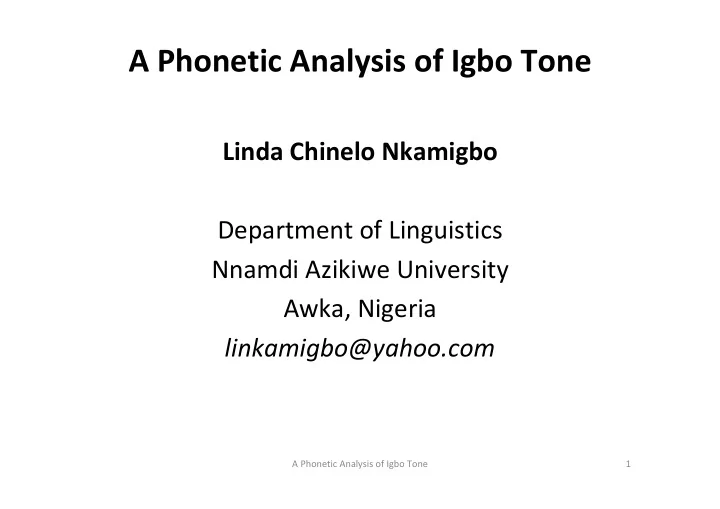

A Phonetic Analysis of Igbo Tone Linda Chinelo Nkamigbo Department of Linguistics Nnamdi Azikiwe University Awka, Nigeria linkamigbo@yahoo.com A Phonetic Analysis of Igbo Tone 1
Abstract This paper studies tone in Igbo, a West Benue ‐ Congo language spoken predominantly in the southeastern part of Nigeria, from a phonetic perspective. The study examines the acoustics of Igbo tone by checking the effects of prevocalic consonants, vowel height and vowel quality on tone as well as the interaction of tone and intonation in the language under. A word list of 128CV tokens and 10 sentences was digitally recorded with an average of 3 repetitions. The digital recordings were made at a sample rate of 44,100Hz. The eight Igbo vowels were used to test the variations that were caused by vowel height and it was observed that vowels bearing high tones are higher than their low counterparts. The study also revealed that voiced consonants have greater perturbations on tone than their voiceless counterparts; Igbo local pitch effect is a lowering of the high tone of the initial pronominal element in interrogatives. This study will contribute to the understanding of the behaviours of tone in Igbo. Index Terms: tone, intonation, pitch effect A Phonetic Analysis of Igbo Tone 2
Overview • 1. Introduction • 2. Research Questions • 3. Methodology • 4. Analysis • 5. Findings and conclusions A Phonetic Analysis of Igbo Tone 3
Introduction • Igbo is a West Benue ‐ Congo language (Williamson and Blench 2000) spoken predominantly in the southeastern part of Nigeria. • Igbo is a tone language because it manipulates tone contrastively on lexical items. • Two distinctive tones are often recognized in • Igbo; in addition, there is a third tone, a downstepped high. The tones are marked as follows: low, [ ↓ ́ ]downstep [ ́ ] high, [ ̀ ] A Phonetic Analysis of Igbo Tone 4
• Quite a significant effort has been devoted to the study of Igbo phonetics (see Ikekeonwu, 1993; Obianika, 1999; Uguru, 2009 for example). A Phonetic Analysis of Igbo Tone 5
Research Questions • This study tends to answer the following questions: • 1. How do voiced prevocalic consonants affect tone in Igbo? • 2. What are the effects of voiceless prevocalic consonants on tone in Igbo? • 3. What are the effects of vowel height on tone in Igbo? • 4. Are there any effects which vowel quality has on tone in Igbo? • 5. What is the interaction of tone and intonation in Igbo? A Phonetic Analysis of Igbo Tone 6
Methodology • A word list of 128CV tokens (8 consonants x 16 vowels) and 10 sentences (5 declaratives + 5 interrogatives) was read by two adult male native Igbo speakers and was digitally recorded. The 16 vowels comprise 8 vowels multiplied by 2. Each token was read 3 times. The speech data were recorded digitally at a sample rate of 44.1kHz, 16 bit wav in mono quality and saved in Praat (www.Praat.org). A Phonetic Analysis of Igbo Tone 7
Analysis For the analysis, I checked so many things which include: • The effects of consonants on tone • The effects of vowel height on tone • The effects of vowel quality on tone • The interaction of tone and intonation • I plotted frequency graphs, made vowel charts and sound spectrograms. A Phonetic Analysis of Igbo Tone 8
Findings and conclusions The graphs show that the perturbation caused by /b/ on a following • high tone is greater than that on a following low tone. /b/ reduces the high tone of +ATR vowels but increases the low tone of +ATR vowels. But then, high tones are quite higher than their contrasting low tones. The effect of /p/ on a following tone is insignificant. For vowel height, vowels bearing high tones are higher than their low counterparts. Concerning vowel quality, there are tonal fluctuations. Tone performs a grammatical function of distinguishing declaratives • from interrogatives in Igbo. Igbo local pitch effect is, therefore, a lowering of a high tone in Sentence Initial Position (SIP) for question formation. For the declarative/interrogative pitch analysis systems, it is observed that the pitch tracks for the second to the last words are almost identical. The only difference is observed at the SIP. The Praat program suggests that there is a high pitch on the initial pronominal element of the declarative while in the interrogative, we could see a very rapid fall in pitch. A Phonetic Analysis of Igbo Tone 9
Acknowledgement • I wish to place on record my sincere gratitude to Prof. Amanda Miller (Ohio State University, USA) for going through the first draft of this paper. A Phonetic Analysis of Igbo Tone 10
References Boersma, P. and Weenink, D., “Praat: Doing phonetics by computer • (version 5.1.25)” [computer program]. Online: http://www.praat.org/, accessed on March 31, 2010. Ikekeonwu, C., “Intonation and focus: A reanalysis of downdrift and • downstep in Igbo”, Working papers. Department of Linguistics, Lund University, 40: 95 ‐ 113, 1993. Obianika, E. C., “Autosegmental analysis of tone in Igbo associative • constructions”, M.A. thesis submitted to the Department of Linguistics and Nigerian Languages, University of Nigeria, 1999. Uguru, Joy O. “On the interaction of tone and intonation in Ika”, • Awka journal of linguistics and languages, 5:53 ‐ 66, 2009. Williamson, K. and Blench, R., “Niger ‐ Congo”, in Heine, B. and • Nurse, D. [Eds], African languages: An introduction, 11 ‐ 42, Cambridge, 2000. A Phonetic Analysis of Igbo Tone 11
Recommend
More recommend